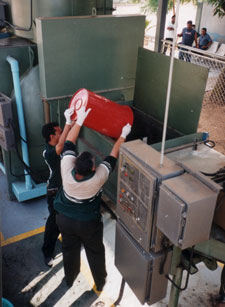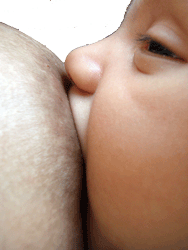 |
A source of many harmful substances in the health sector is the incineration of waste from this sector. During incineration of medical waste (such as chlorine containing PVC-plastics) thousands of new chemicals are created. Among these are large amounts of ozone layer harming nitrogen-oxides and the very stable PCB’s, furans and dioxins, including the very toxic 2,3,7,8-p-tetrachlorinedibenzodioxin (2,3,7,8,-TCDD). The health sector is currently responsible for operating many thousands of waste incinerators worldwide, without any filters and emission controls, which are emitting harmful substances into the atmosphere. In the USA, during the 1990s, the health sector was responsible for 50% to 60% of dioxin emissions. In Colombia (South America) in 2002 the health sector operates 360 unfiltered ovens 1). Photo: hospital waste incinerator, South America (stg. Huize Aarde) |
